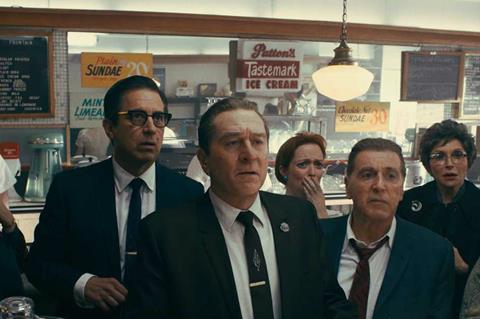Films are getting longer and longer, and this year’s awards season is no exception - providing a headache for cinema programmers and potential discomfort for audiences.

Alfred Hitchcock once said: “The length of a film should be directly related to the endurance of the human bladder.” By that measure, viewers of Martin Scorsese’s The Irishman will have to dash out of the theatre at least once during its 209-minute runtime.
This is becoming a familiar feeling to cinemagoers who have seen run-times rise in recent years. The top 10 films of 2008 at the UK and Ireland box office had an average duration of 112 minutes while the top 10 of 2018 averaged out at 126 minutes, as do the equivalent titles for 2019 to date, according to Comscore.
Supersized films have also translated into bumper box office with Quentin Tarantino’s Once Upon A Time In… Hollywood running 161 minutes and making $367m worldwide; horror sequel It: Chapter Two lasting 169 minutes and topping $450m worldwide; and Avengers: Endgame clocking in at a whopping 181 minutes and ranking as the biggest release of all time with $2.8bn at the global box office.
“The recent example of Avengers: Endgame suggests that audiences are not necessarily dissuaded from seeing a film on the basis of its length,” says Phil Clapp, CEO of the UK Cinema Association. “A film should perhaps be as long as it needs to tell its story in an engaging way, in a way that continues to appeal to the audience over the entirety of the film. But the longer it is, the less showings can reasonably fit into the day, with a potential impact on overall revenues generated.”
Many cinema chains will not face this problem with The Irishman, as the likes of AMC and Regal in the US and Vue and Picturehouse in the UK have simply refused to screen it. This is not a result of its weighty run- time but because Netflix opted not to respect the 16-week window (90 days in the US) of theatrical exclusivity and will begin streaming the film on November 27. Scorsese’s gangster drama will, however, receive a limited release in the UK from November 8 at Everyman, Curzon and independent cinemas.
Crispin Lilly, CEO of Everyman Media Group, says: “There are two perspectives on this [running times]. There’s the blunt, commercial side and the more esoteric side. If you talk about it on a purely operational level, we’re pleasantly delighted by anything under two hours. But, fundamentally, we love quality films and, if a film is good, people will want to see it.”
With The Irishman, Lilly acknowledges Everyman will struggle to programme three screenings in a day. “But it’s not the sort of film you’d play too early in the day and it will over-index in terms of weekend screenings,” he says. Lilly also believes multiplexes would have programmed the film, in spite of its length, had Netflix observed the theatrical window.
Beyond exceptions like Scorsese and the big-budget spectacles of Marvel and Star Wars films, the Everyman chief says: “What bugs me is a filmmaker who hasn’t tightened up a film to be commercial enough. The average person goes to the cinema three times a year and they crave formula, entertainment and brevity. They do not want a two-and-a-half-hour film.”
Time management
Indie and foreign-language titles also benefit from running under two hours, according to Eve Gabereau, managing director of distribution and production company Modern Films. “A film with a long running time can be a negative, in terms of exhibitors getting people through the door, and you consider whether audiences will take the time,” says Gabereau. “But if a film is good and the reviews are good, it hopefully doesn’t matter to audiences.”
While head of Soda Pictures (now known as Thunderbird Releasing), Gabereau oversaw the UK release of Maren Ade’s German hit Toni Erdmann, where its 162-minute runtime was part of its unique selling point (“Have you seen this three-hour German comedy?”).
She faced a similar challenge with 189-minute German drama Never Look Away, which received glowing reviews and Oscar nominations but struggled to find an audience on home turf; original UK distributor Curzon backed out and put the rights back on the table, allowing Modern Films to secure it. “We chose to do fewer shows over a longer period of time,” recalls Gabereau of the strategy, adding that the film was released in two parts in France. Her approach paid off, with Never Look Away finally reaching $159,000 (£123,000) in the UK — 9.6 times its three-day opening weekend figure.
Prestige foreign titles with long runtimes set for UK release include Bong Joon Ho’s Palme d’Or winner Parasite (132 minutes), which Curzon Artificial Eye will handle; Cannes Un Certain Regard winner The Invisible Life Of Euridice Gusmao (139 minutes), distributed by New Wave Films; and Wang Xiaoshuai’s Berlinale award-winner So Long, My Son (185 minutes), also handled by Curzon. Terrence Malick’s A Hidden Life, which combines English and German language, runs at 173 minutes.
“The great running-time debate is in full swing with filmmakers increasingly pushing the envelope with films that not only test the stamina of audiences, but also the cinema’s bandwidth in terms of the number of showings per day,” says box-office analyst Paul Dergarabedian of Comscore. “It’s actually a fantastic show of support by the studios to filmmakers, who are enabled to fully realise their vision on the big screen despite the fact a film hovering around the three-hour mark is technically at a disadvantage with regard to generating revenue.
“While conventional wisdom would dictate long running times hurt box-office potential, particularly on opening weekend,” Dergarabedian adds, “the benefits that come in the long run from the long-form cinema experience may be worth the risk.”















![[L-R]: Amanda Villavieja, Laia Casanovas, Yasmina Praderas](https://d1nslcd7m2225b.cloudfront.net/Pictures/274x183/6/4/1/1471641_pxl_20251224_103354743_618426_crop.jpg)








![[L-R]: Amanda Villavieja, Laia Casanovas, Yasmina Praderas](https://d1nslcd7m2225b.cloudfront.net/Pictures/100x67/6/4/1/1471641_pxl_20251224_103354743_618426_crop.jpg)
No comments yet